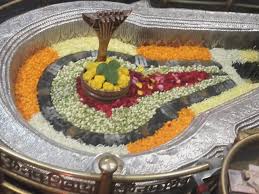Bhimashankar Jyotirlinga temple is located in Pune, India. The Temple is at Bhavagiri Village, 110 km from Pune and River Bhima has emerged out of the sweat of Lord Bhimashankar after the battle with Demon Bhima and the river is said to be blessed by the Lord Shiva by himself and distributed towards South-East to merge with River Krishna, has a religious significance which give rise to Agriculture and Economy in the surroundings. The temple exhibits a fine balance and portrays the Nagara Style of Architecture.
History
Demon Bhima son of Kumbhakarna, performed severe penance to please Lord Brahma, was granted with immense skill and talents. With this boon, demon Bhima started creating fear and destruction in the three worlds, defeating King Indra, conquered the heavens. He also defeated the staunch devotee Kamrupeshwar and put him behind prison. The Gods, Devas and Lord Brahma prayed Lord Shiva to rescue the universe from this demon. He also demanded Kamrupeshwar to worship the demon instead of Lord Shiva, but the devotee refused.Lord Bhima wants to strike Shiva Linga using his sword but as soon as he raised his sword. Lord Shiva appeared before him in Stupendous form with a radiance. War began between Lord Shiva and Demon Bhima, for a very long period and on the request of Sage Narada, Lord Shiva has put an end to this war defeating the demon to ashes. Upon the requests of holy stages and all other Gods, Lord Shiva made this place as his Abode and manifested himself in the form of Lord Bhimashankar Jyotirlinga and the sweat came out of his body after the battle formed the Bhimarathi River.
Lord Bhimashankar is another form of Lord Shiva which amalgamates both divine and natural phenomena comprising beauty and nature as a sacred totality, is said to be originated from the Mother Earth, Goddess Adi Parashakti. This is one of the form of Dwadash Jyotirlingas or 12 Jyotirlingas, situated in Pune, Maharastra, which is located at Sahayadri Range, an extreme ghat region, principally cherish and exalts as Bhimashankara who is no other than Lord Shiva.
Jyotirlingas shows the light through radiance of Lord Shiva, where "Jyoti" means radiance and linga means "Iconic of Lord Shiva" and is a combination of light and soul in an non-human form. The combination of divine and nature with radiance, is a sacred worship in a phallic form, exists in a very high form of personified natural powers, governing the universe.
Temple Opening Time
Morning 4.00 AM to Evening: 9.00 PM
Do:
-
Do pray your Ishta Devata before pilgrimage to Temple.
-
Do contact Temple Devasthanam information centre for enquiry, temple information and for Pooja details etc.
-
Do reserve your travel and accommodation at Temple well in advance.
-
Do bath and wear clean clothes before you enter the temple.
-
Do concentrate on God and Goddess inside the temple.
-
Do maintain silence and recite Om Namahsivaya or your Istamantram to yourself inside the temple.
-
Do observe ancient custom and traditions while in Temple.
-
Do respect religious sentiments at Temple.
-
Do deposit your offerings in the hundi only.
Don't s:
-
Do not come to Temple for any purpose other than worshipping of God and Goddess.
-
Do not smoke at Temple.
-
Do not consume alcoholic drinks at Temple.
-
Do not eat non-vegetarian food in the Kshetram.
-
Do not approach mediators for quick Darshanam. It may cause inconvenient to others.
-
Do not carry any weapon inside the temple.
-
Do not wear any head guards like helmets, caps, turbans and hats inside the temple premises.
-
Do not perform Sastanga Pranama inside the Sanctum Sanctorum.
-
Do not take much time while performing Sparsa Darshanam to God in Garbhagriha.
-
Do not buy spurious prasadams from street vendors.
-
Do not encourage beggars at Temple.
-
Do not spit or create nuisance in the premises of the temple.
Do:
-
Do pray your Ishta Devata before pilgrimage to Temple.
-
Do contact Temple Devasthanam information centre for enquiry, temple information and for Pooja details etc.
-
Do reserve your travel and accommodation at Temple well in advance.
-
Do bath and wear clean clothes before you enter the temple.
-
Do concentrate on God and Goddess inside the temple.
-
Do maintain silence and recite Om Namahsivaya or your Istamantram to yourself inside the temple.
-
Do observe ancient custom and traditions while in Temple.
-
Do respect religious sentiments at Temple.
-
Do deposit your offerings in the hundi only.
Don't s:
-
Do not come to Temple for any purpose other than worshipping of God and Goddess.
-
Do not smoke at Temple.
-
Do not consume alcoholic drinks at Temple.
-
Do not eat non-vegetarian food in the Kshetram.
-
Do not approach mediators for quick Darshanam. It may cause inconvenient to others.
-
Do not carry any weapon inside the temple.
-
Do not wear any head guards like helmets, caps, turbans and hats inside the temple premises.
-
Do not perform Sastanga Pranama inside the Sanctum Sanctorum.
-
Do not take much time while performing Sparsa Darshanam to God in Garbhagriha.
-
Do not buy spurious prasadams from street vendors.
-
Do not encourage beggars at Temple.
-
Do not spit or create nuisance in the premises of the temple.
